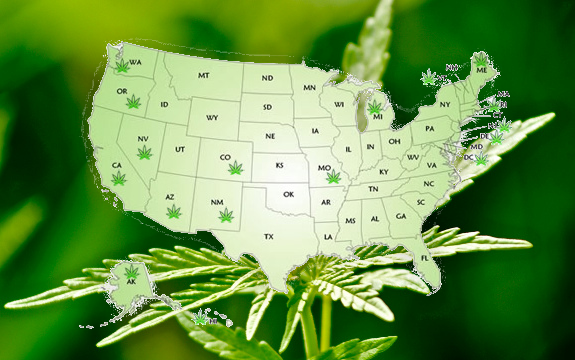
There’s a lot of talk this election cycle about “normalization” – but one topic of normalization that may be flying under the radar is the growing acceptance and legalization of marijuana throughout the United States. In just this past election, California, Massachusetts, and Nevada legalized marijuana possession, joining a handful of other states (such as Colorado and Washington State) that had already legalized it. With the addition of California, Massachusetts and Nevada, the percentage of Americans living in states where marijuana use is legal for adults rose above 20 percent, from 5 percent. The California measure, which passed with 56 percent approval, allows people over 21 to possess limited amounts of marijuana for personal use and also permits the personal cultivation of up to six plants in private residences, provided they are shielded from public view. The sale of recreational marijuana will not be allowed until licenses are issued, a process that will take at least two years. So that’s progress, right? Absolutely. But what does it mean for residents of Virginia? Unfortunately, probably not a lot.
Possession of marijuana is still illegal in the Commonwealth of Virginia. And, in all likelihood, it’s going to be that way for some time. Virginia’s anti-marijuana stance, however, stands in clear contrast to the tide of national sentiment. A Gallup poll in October found nationwide support for legalization at 60 percent, the highest level in the 47 years the organization has tracked the issue.
Support is rising even though some public health experts warn that there have been insufficient studies of the drug’s effects and that law enforcement agencies lack reliable tests and protocols to determine whether a driver is impaired by marijuana.
That fact is, however, that the Virginia Assembly is not yet even ready to back away from its tough penalties for simple possession convictions, much less actual legalization. The House committee recently rejected SB 104, which would have reduced the penalty for first possession of cannabis to a civil fine of only $100. The law remains the same, with first offenders still facing a fine of up to $500 and one month in jail, regardless of whether they have epilepsy. Furthermore, SB 613 was approved by the Senate, and would have eliminated the automatic 6-month driver’s license suspension that is part of the penalty for a first-time marijuana possession, but oddly enough it was shot down by the House committee.
While the trend in much of the United States is moving toward decriminalization or legalization of marijuana, Virginia is heading in the opposite direction: With sharply rising arrest totals for the possession of pot and a disproportionate number of African Americans arrested in the Commonwealth, according to a new study based on state data reported to the FBI. The ratio of black-to-white marijuana arrests was 2.4 to 1 in 2003, but in 2013, it was 3.3 to 1. In the three years from 2011 to 2013, annual possession arrests by Virginia law enforcement went up by about 2,000 a year, and black Virginians accounted for 82 percent of the increase.
Virginia law enforcement authorities still see marijuana as a dangerous drug and are not inclined to reduce enforcement. Dana Schrad, executive director of the Virginia Association of Chiefs of Police, said state police officials are “closely watching the outcomes in Colorado and Washington state to monitor how their legal reforms have impacted the quality of life in those states. We’re also very interested in the impact of the District’s reforms on Northern Virginia.”
So although the national trend is clear, temper your expectations with Virginia. It’s going to be a while.
If you’ve been charged with possession of marijuana in Virginia, be sure to reach out to our expert defense attorneys for a free consultation.
Contact Ervin Kibria Law at (703) 962-7790





